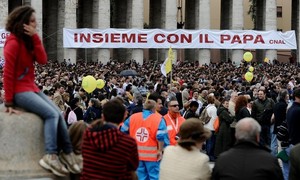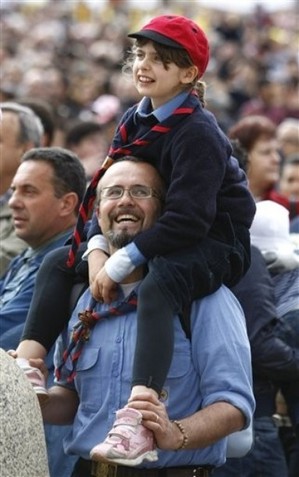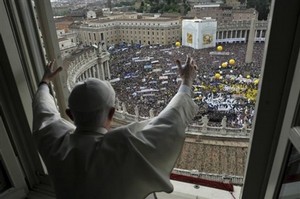
Today in Rome members of the various Catholic lay ecclesial movements like Focolare, Sant'Egidio, Catholic Action and Communion and Liberation are gathering in Rome as a sign of prayerful solidarity at the Regina Coeli address of the Pope in Saint Peter's Square. Indeed, in a sign of friendship and obedience to the Successor of Saint Peter, Pope Benedict XVI. And as a sign of this worldwide communion with the Pope, members of Communion and Liberation are gathering in cities around the world in prayer for the Pope and the Church.
According to news about the event, about 150,000 people flooded Saint Peter's Square. The Pope said that he was comforted by the "beautiful and spontaneous show of faith and solidarity."
Here in New York, for example, CL is attending the Mass at Saint Patrick's Cathedral with Archbishop Timothy Dolan and will pray the rosary together.
To understand these pious and fraternal gestures of CL, here are some thoughts of Monsignor Luigi Giussani that may give a fuller appreciation of the companionship of faith and brotherhood we all share.

Christianity is an irreducible event, an objective presence that desires to reach man; until the very end, it means to be a provocation to him, and to offer a judgment of him. Jesus said to the Apostles after his Resurrection, "Behold, I am with you always, even to the end of the world" (Mt 28:20).
Christianity will have a dramatic and decisive bearing on man's life only if it is understood in accordance with its originality and its factual density, which, two thousand years ago, had the form of a single man. Yet even when He was still living, he also had the face of people whom he had brought together, and then sent out two by two, to do what He had been doing, and what he had told them to do; they came back together and returned to him. Later, united as one, this people went out to the entire known world to present that Fact. The face of that single man today is the unity of believers, who are the sign of him in the world, or as Saint Paul says, who are his Body, his mysterious Body - also called "the people of God" - guided and guaranteed by a living person, the Bishop of Rome.
If the Christian fact is not recognized and grasped in its proper originality, it becomes nothing more than a ponderous occasion for all sorts of interpretations and opinions, or perhaps even for works; but then it lies alongside of or more often subordinate to all of life's other promptings.
(Religious Awareness in Modern Man, Communio, vol. XXV, n.1, Spring 1998, pp. 134-135)
The supreme authority is the one in which we find the meaning of all our experience. Jesus Christ is this supreme authority, and it is His Spirit who makes us understand this, opens us up to faith in Him and His person. "Just as the Father has sent me so do I send you." (See John 20:21) The apostles and their successors (the Pope and the bishops) constitute, in history, the living continuation of the authority who is Christ. In their dynamic succession in history and their multiplication throughout the world, Christ's mystery is proposed ceaselessly, clarified without errors, defended without compromise. Therefore, they constitute the place, like a reliable and effervescent spring, where humanity can draw on the true meaning of its own existence, probing ever deeper. What genius is to the cry of human need, what prophecy is to our cry of expectancy, so the apostles and their successors are to announcing the response. But just as the true answer is always perfectly specific and concrete with respect to the expectancy which is inevitably vague and subject to illusions - so are they, like an absolute and reliable rock, infallible: "You are Peter and on this rock I shall build my Church." (Matthew 16:17ff.)

Their authority not only constitutes the sure criterion for that vision of the universe and history that alone explains their (i.e., the universe's and history's) meaning; it is also vital - it steadfastly stimulates a true culture and persistently points to a total vision. It inexorably condemns any exaltation of the particular and idealization of the contingent; that is, it condemns all error and idolatry. The authority of the Pope and bishops, therefore, is the ultimate guide on the pilgrimage towards a genuine sharing of our lives [convivenza], towards a true civilization.
Where that authority is not vital and vigilant, or where it is under attack, the human pathway becomes complicated, ambiguous, and unstable; it veers towards disaster, even when on the exterior it seems powerful, flourishing, and astute, as is the case today. Where that authority is active and respected, the historic pilgrimage is confidently renewed with serenity; it is deep, genuinely human, even when the expressive methods and dynamics of sharing lives are roughshod and difficult.
Still today it is the gift of the Spirit that allows us to discover the profound meaning of Ecclesiastical Authority as a supreme directive on the human path. Here is the origin of that ultimate abandonment and of that conscious obedience to it - this is why it is not the locus of the Law but of Love. One cannot understand the experience of that definitive devotion that binds the "faithful" to Authority without taking into consideration the influence of the Spirit, and that devotion often affirms itself on the Cross of a mortification of the drive of our own genius or our plans for life.
(The Journey to Truth Is an Experience, Montreal:
McGill-Queen's University Press 2006, pp. 73-75)

